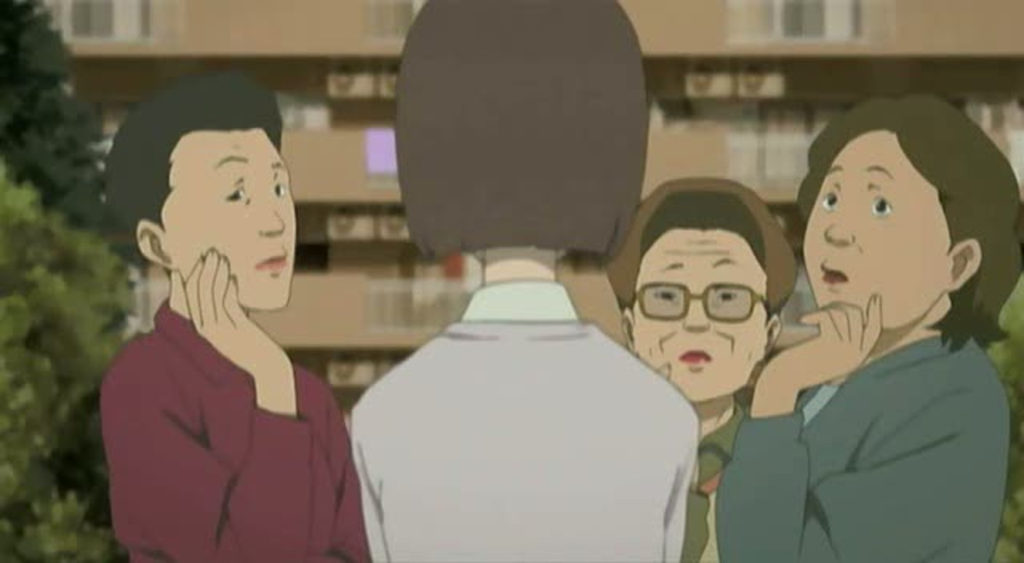Perhaps the oddest episode of Paranoia Agent thus far – and coming hard on the heels of both “MHz” and “Happy Family Planning”, we’re talking seriously odd – “ETC” is another one of those slow down, take a breath, let the plot idle sort of episodes, with even less to do in terms of the grand plot than “The Holy Warrior”. Save for a tossed-off reference (maybe) to Lil’ Slugger’s appearance in a hotel in “Happy Family Planning”, there is absolutely no narrative thread connecting this episode to the eight preceding it, not even a cameo by the ubiquitous Maromi. In fact, the content of “ETC” mostly seems to be false even in relationship to itself: not only doesn’t it “matter” to the show, it doesn’t “matter” in the very moment it is communicated to us. Yet, much as the last episode did, it treats on the greater society in which the series unfolds, telling us much about the kind of world in which Lil’ Slugger thrives, and the impact of this wandering, unfocused 24 minutes is infinitely greater than its “meaning”.
Internet chatrooms; video games; kawaii branding; so far, everything that has fallen under Kon Satoshi’s satiric eye in Paranoia Agent is hyper-modern, but in “ETC” he turns to something much, much older: the uninformed prattle of gossiping housewives. The framework narrative of the episode follows four women, three old friends and Kamohara, a relative new resident in their apartment complex. This collection of individuals is so conspicuously anonymous that they don’t even get real names or personalities, and save for some details of Kamohara’s home life (she’s married to a screenwriter), no backstories. We caught a glimpse of them all the way back in the first episode, but other than that, they might as well not even exist. This sounds like a complaint, I realise, but in foregrounding such uninteresting characters after what amount to eight densely-packed character studies, it’s both a nice change of pace, and a clear indication that we’re meant to take the content of the episode as archetypal: conversations like the one we witness in “ETC” are going on all over the city, presumably.
The four women are talking about Lil’ Slugger: each of them has at least one story that happened to a friend’s brother’s co-worker, that sort of thing, and the whole episode consists of nothing but vignettes:
-A teenage boy, having studied for an important math test, finds himself sneezing and vomiting out his knowledge in the form of little black words, and as he panics, Lil’ Slugger assaults him in the bathroom. Some time later, he commits suicide.
-A henpecked daughter-in-law is prepared to beat her mother-in-law, but Lil’ Slugger appears at the front door, and mistakenly kills the old woman himself.
-A mob boss wants to hire Lil’ Slugger as an enforcer, and terrorises his underling in an attempt to make the phantom show up.
And several other things along in that vein. The three older women are content to swap stories with abandon, but every time poor Kamohara tries to add her two cents, the others mock her for the patently absurd lies she’s peddling. This despite the fact that her stories are neither more nor less impossible than the ones they’re telling (the very first story we hear is of the young man spitting up his knowledge – from that point on, we can hardly take any of this seriously at all). More to the point, the old women likely know that their gossip is so much hot wind, and don’t care, and it’s Kamohara’s desperate attempts to fit in that repel them, not the quality of her stories per se. Which adds even more of a pathetic tinge to the Twilght Zone-esque final moments of the episode, in which Kamohara finally gets her chance to impress the others.
Above and beyond whatever it has to say about these four women, “ETC” is a cockeyed, cynical look at the way that people tend to bask in the reflected light of the news. “Oh, I know about that!” – it’s the cry of anyone who wants to look smarter and cooler and better than everyone else, trying madly to win in the constant game of one-upping everyone else. The precise nature of the episode makes it all about the tired gossip of bored people, but it’s easy enough to apply it outwards to anyone who would rather make the news about what they know than about what’s happening in the world. It’s an entirely sour worldview, but do we expect anything other than sourness out of Paranoia Agent by this point?
“ETC” does virtually nothing other than set a mood, but it does this so damn well that I, for one, never noticed that it’s nothing more than wheel-spinning. As a quick snapshot of where Paranoia Agent finds itself running into the last third of episodes, it’s a perfect embodiment of all the feeling of universal wrongness that has made all the series to this point such a sick kick, and a promise that the things to come will not let up in one tiny degree on the bleached-out weariness of the series. Quite the contrary.
